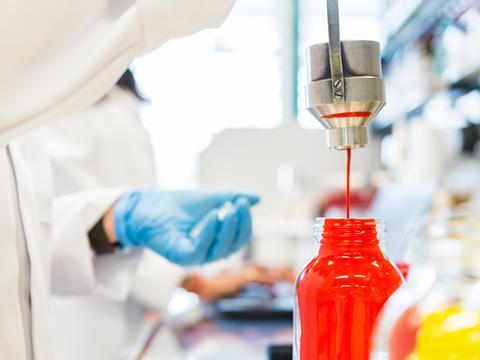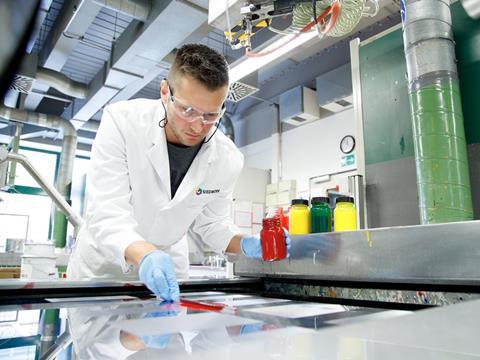
With the development of a deinking and delamination primer, Siegwerk hopes to open the door to the next level of serious recycling for plastic packaging material. This proprietary technology enables the separation of complex laminated packaging structures combined with the removal of inks and varnishes with the goal of yielding high-quality recyclates ready to be reused in many applications.
In this Innovation Spotlight, Stefan Häp, head of technology and innovation brand owner collaboration at Siegwerk, explains to us why this is a key lever to integrate plastic packaging materials further towards a circular economy.
We already need three planets to meet today’s consumption patterns in the developed world. That’s why recyclability plays an integral role in future packaging designs and structures with regard to the sustainable use of resources. Keeping materials in closed cycles minimizes waste and avoids leakage that causes ecological and economic harm.
Packaging needs to be rethought to design out waste and pollution right from the beginning and regenerate natural systems. These are the principles of the so-called circular economy, a new economic approach that already became a relevant management model for most FMCG brand owners within recent years.
In parallel, plastic packaging became incredibly complex within the last decades to continuously increase performance, reduce weight and, particularly, costs. Today, modern flexible plastic packaging often consists of several layers of different plastic types, decorated with bright and colorful inks and glued together for eternity. A big challenge for any recycling efforts.
So, the major challenge in making plastic packaging fit for a circular approach is to adapt the complexity of high tech packaging material structures to - in the best case - existing recycling streams without compromising the main purpose of the package: keeping content fresh and consumable for a sufficiently long time.
The key is the use of only one plastic material type, preferably even just one film layer recyclable in existing plastic recycling streams. Using, for example, only polyethylene or polypropylene as packaging material, where the functionality is acceptable for the end-use, works well in many industrialized countries as the corresponding recycling infrastructure is already in place.

However, the plastic recycling industry is neither an NGO nor self-sustaining. To avoid an ecologically undesirable landfill or the incineration of plastic packaging (questionably called "thermal recycling"), serious recycling needs to pay off sufficiently for all stakeholders.
Besides, using EPR fees to counter the ecological consequences of non-recycled materials the composition of the packaging material remains decisive for using the recycled materials in a meaningful way. To do so, recyclates have to be as clean as possible.
Good quality recyclates require a separation of laminated materials into their individual film components and the removal of any coating like inks, varnishes, and adhesives to yield raw materials that are suitable for a reasonable reuse.
Here, the proprietary deinking and delamination primer technology from Siegwerk can serve as a key lever to facilitate recycling. Implementing these delamination primers into a packaging structure enables the separation of laminated structures into their individual film layers by using a so-called "hot washing step" in the recycling stream. In addition, the primer facilitates a deinking of the printed films to ensure a colorless film layer that can be instantly reused for producing new high-quality plastic materials.
If a delamination step is not required e.g. for already optimized monolayer packaging structures, the company also offers a technology that facilitates the deinking step likewise.
This new primer technology helps to significantly reduce the need for new plastic material and thus the use of finite resources by giving access to high-quality recycled material. This is a key lever to give plastic waste an economical value that allows serious recycling and avoids problematic landfill and so-called thermal recycling.
While it is always recommended to simplify material structures towards mono-materials where possible, the delamination primer technology provides a solution to improve the recyclability of multi-material packaging structures that are needed to deliver high functionality for complex packaging requirements. and enable packaging circularity in terms of a circular economy.
For more information contact deinking@siegwerk.com.
This content was sponsored by Siegwerk.













